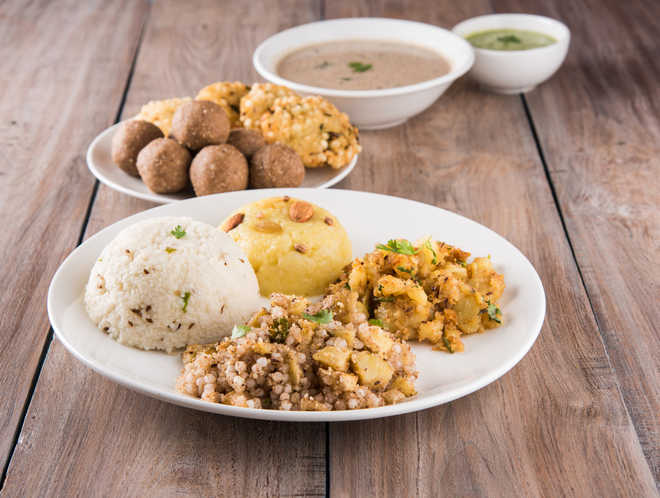
Navratra delicacies
Dr RK Singal
Both modern as well as Indian school of medicine strongly advocate fasting during the change of seasons, as it has different effects on your physical, mental and spiritual being. Navratras, both Chaitra (April) and Sharad (September-October), mark the beginning of summer and winter, respectively. During Navratras many people observe fast. Sharad Navratras are in full swing now and people, who are fasting during these days, should observe fast(s) with proper planning about their diet, food intake etc.
At the time of seasonal changes, the body’s immunity levels dip. Viral infections are quite common during this time. Eating light, nutritious meals can help you in avoiding various health problems which may affect you due to low immunity. It is best to avoid non-vegetarian food, alcohol, grains and pulses during the time of seasonal change. Bingeing on oily, sugary, heavy and/or fried food can further take its toll on dipping immunity levels, which is why it is advisable to eat light and clean foods. Therefore, fasting becomes a good way to detox as well.
Eating even before feeling hungry weakens the digestive system, which in turn leads to stress and a poor immunity level. Fasting increases our digestive fire and this fire burns the lethargy and dullness in the body that comes through excessive eating. That is why people avoid grains and wheat while fasting. Hence the body feels fresh and light after fasting.
Breaking fast and after
Dos
- Hydration: Keep yourself hydrated well with water and other natural liquids throughout the day. You should break your fast with a small and light meal. Drink water half an hour before or after a meal.
- It is advisable to break your fast with fresh fruits and fresh juices without adding refined sugar. If you have been eating fruits during the day or fasts, eat green and leafy salad with curd in the evening.
- Digestion: Add a bowl of plain curd to your diet after the fasts. Curd is full of nutrients and probiotics. Once your appetite gets stronger, gradually add grains and pulses in addition to veggies. Eat small meals every two or three hours.
Don'ts
- After the fasting period is over, people are usually tempted to overeat. Avoid bingeing.
- Do not indulge in oily and spicy food immediately after the fasts as these may cause acidity and indigestion.
- Fried food and high-calorie sweets are also avoidable as these may lead to constipation.
- Fasting is a detoxifying process for the body. Avoid reloading it with heavy and unhealthy food immediately after. Eat simple and light food and stay healthy.
Rooting for root vegetables
There are no restrictions on any fruit though there are certain vegetables that are restricted during the fasting period. Vegetables like potatoes, lauki (bottle gourd), yellow pumpkin, spinach, arbi (colocasia), cucumber, sweet potato,etc. are allowed during Navratra fasts. Any root vegetable or tubers can be eaten during these fasts. These vegetables are loaded with many essential nutrients, minerals and vitamins.
Things to keep in mind
1. Keep yourself hydrated: Keeping yourself fully hydrated is vital as restricting normal diet brings down adequate supply of nutrients to your body. Hydrating and nourishing drinks like fresh coconut water, fresh fruit juices, buttermilk or a glass of nimboo paani could be of immense help. Avoid drinking too much tea or coffee.
2. Make it a sugar-free period: Although sugar is not restricted, it is advisable to keep away from sugar and sugary foods such as sweets or desserts, etc. Refined sugar has no nutritive value and only gets stored in the system as empty calories.
3. Avoid processed food: Avoid chips, fries, and all other foods that are loaded with unhealthy fats or excess sodium. These foods can cause a rapid rise and fall in blood sugar and or pressure after consumption, resulting in hunger and overeating. Eat fibre-rich foods as these are very helpful in detoxifying the body. Fibre also helps ensure your blood sugar remains stable.
4. Fruits are fruitful: Eat fresh fruits to get a steady supply of vitamins and minerals. These can help you keep energised throughout the day. You can munch on fruits every few hours. Make sure these are seasonal and fresh.
5. Eat at regular intervals: It is healthy to eat small and frequent meals through the fast(s) to keep your blood sugar controlled and metabolism up. Small snacks between meals like fruit chaat, baked shakarkandi with sendha namak and black pepper or raw banana kebabs are some of the tasty options you can explore this fasting season.
—The writer is chairman, department of internal medicine, BLK Super Specialty Hospital, New Delhi



























